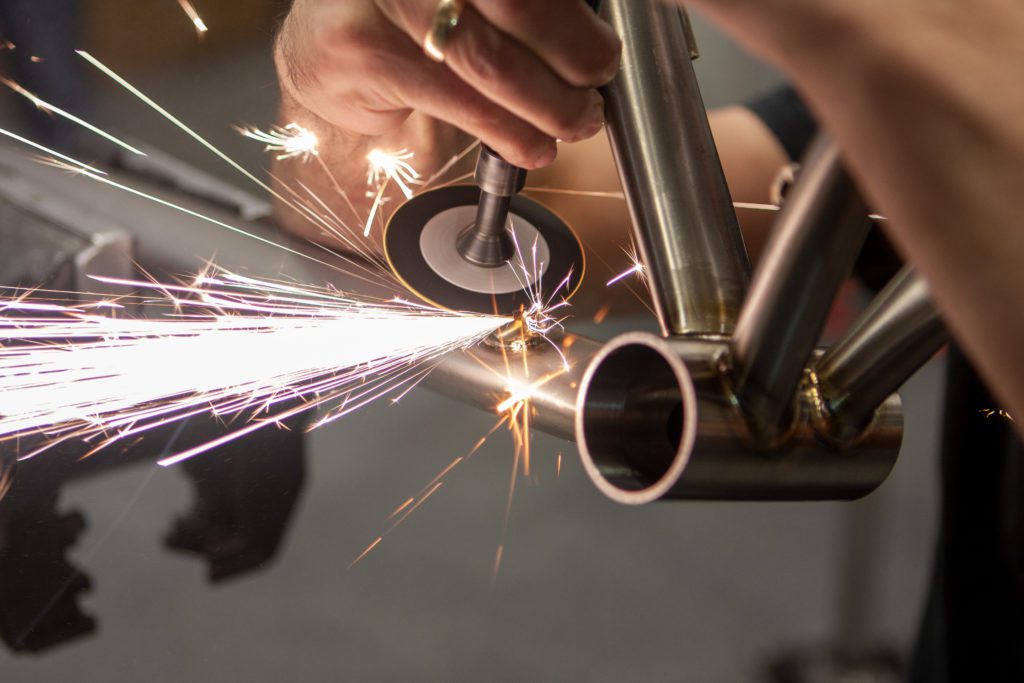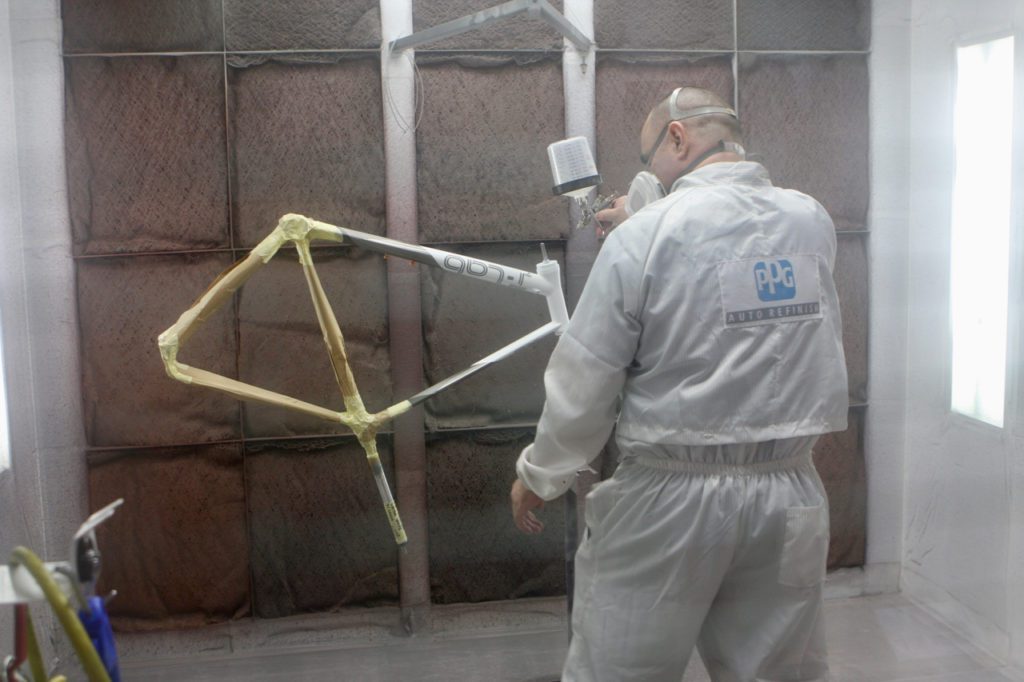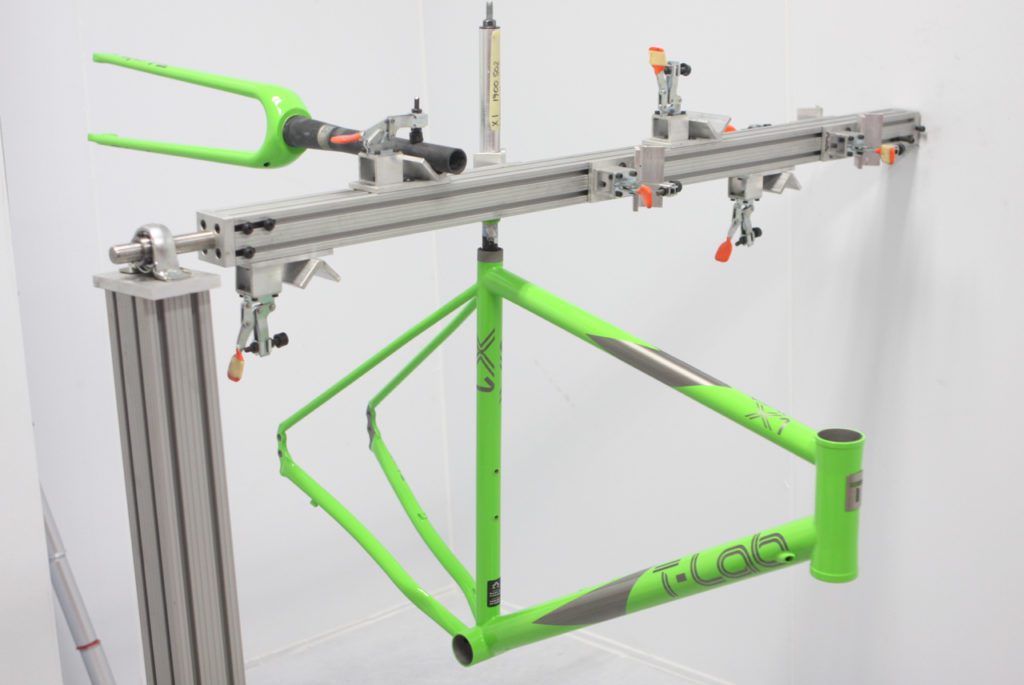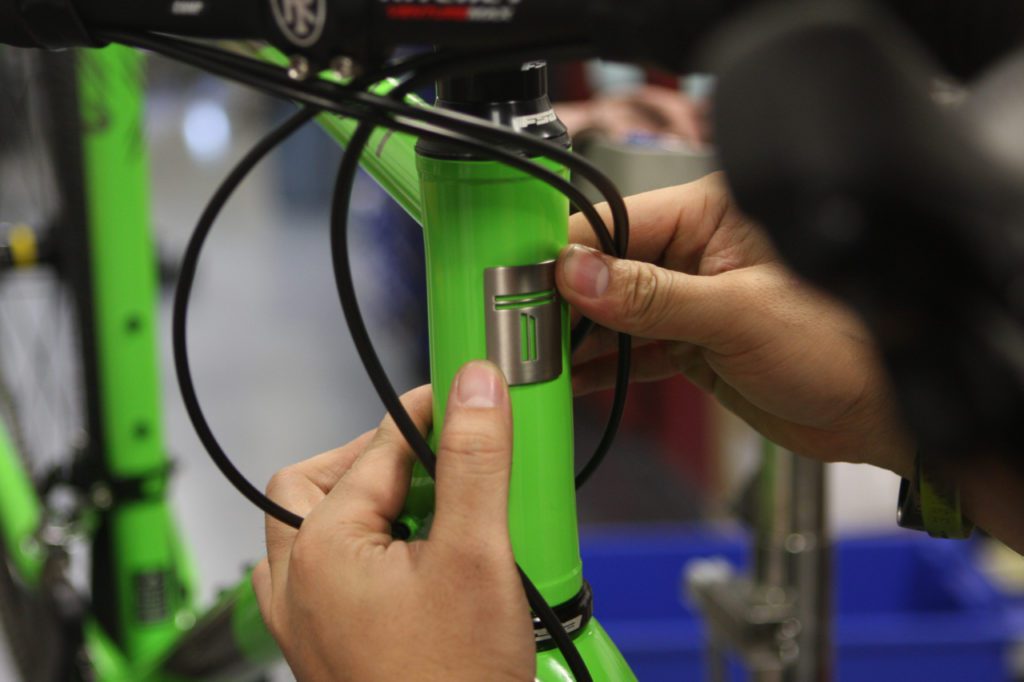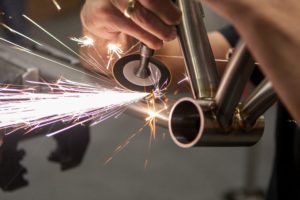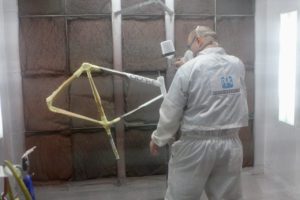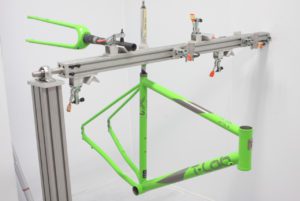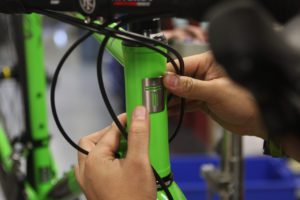T-Lab has been building handmade titanium frames in Montreal for a little more than two years. The company relies on many of the same experienced founders, managers and staff that had worked at the former Guru Cycles. T-Lab, however, is focused on pushing the boundaries of what is possible to achieve in bicycle frames built with titanium rather than carbon fibre. Using radically shaped tubing, T-Lab is making frames that have a unique and modern esthetic while achieving the performance characteristics desired by discerning bike riders.
“We wanted to do something new and push things forward. The challenge we gave ourselves was how do we make a titanium frame according to the modern riding standards that also brings superior quality to the table,” says T-Lab co-founder Roberto Rossi. “We wanted to do something fresh and different.”
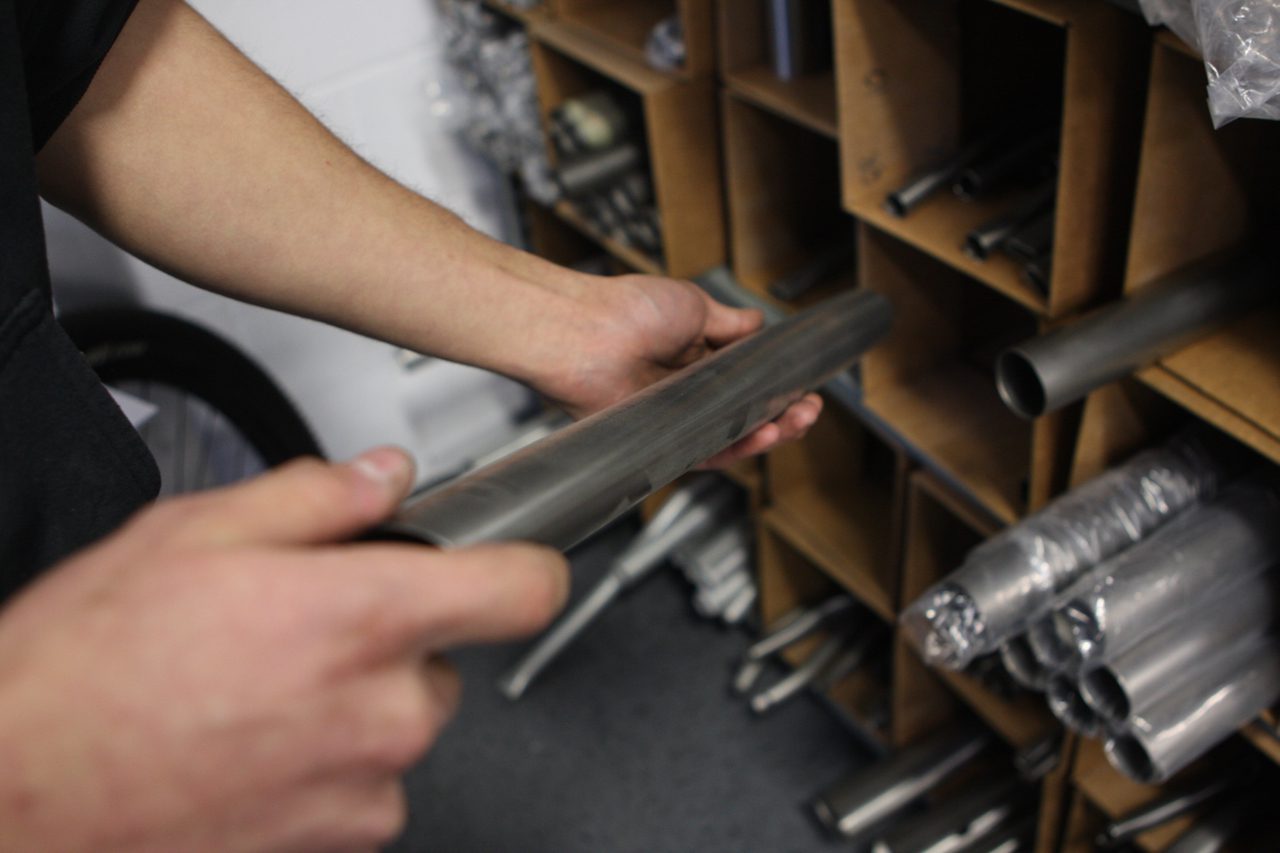
It was in the process of shaping the titanium tubing that T-Lab saw the greatest opportunity to optimize the characteristics of its frames while maintaining the highly desirable ride quality of the metal. Designers also wanted to make bikes that were reflective of how people are riding today. A frame should be rigid laterally and fast, but also accommodate wider tires and different wheel standards.
Why titanium?
Titanium is a durable and light metal that resists corrosion and offers an exceptional ride quality. But T-Lab found that traditional titanium tube shapes didn’t offer the lateral stiffness and rigidity of modern bikes because of the shapes builders are able to achieve with carbon fibre. While the team at T-Lab liked many of the characteristics of titanium, their challenge was to form tubing that addressed the shortcomings of the existing shapes. After much research and development, and trial and error, T-Lab achieved the desired characteristics it was aiming for. T-Lab’s bikes start with Grade 9 (3Al – 2.5v) titanium tubing sourced from North American suppliers.

Built just for you
While T-Lab does have stock geometries for adventure riding and race bikes, each bike is built specifically for a particular customer in mind. That means if you want custom geometry or a bike built to your specifications, it’s possible. Still, the company does follow some general guidelines when it builds all its frames.
“We follow common geometric directives on all our bikes. I consider what we do more of a platform than a geometry. We want to make fast bikes with short chainstays, and a compact back triangle for a lot of maneuverability and agility, but that can also accommodate wide tires and 650B wheels,” explains Rossi.
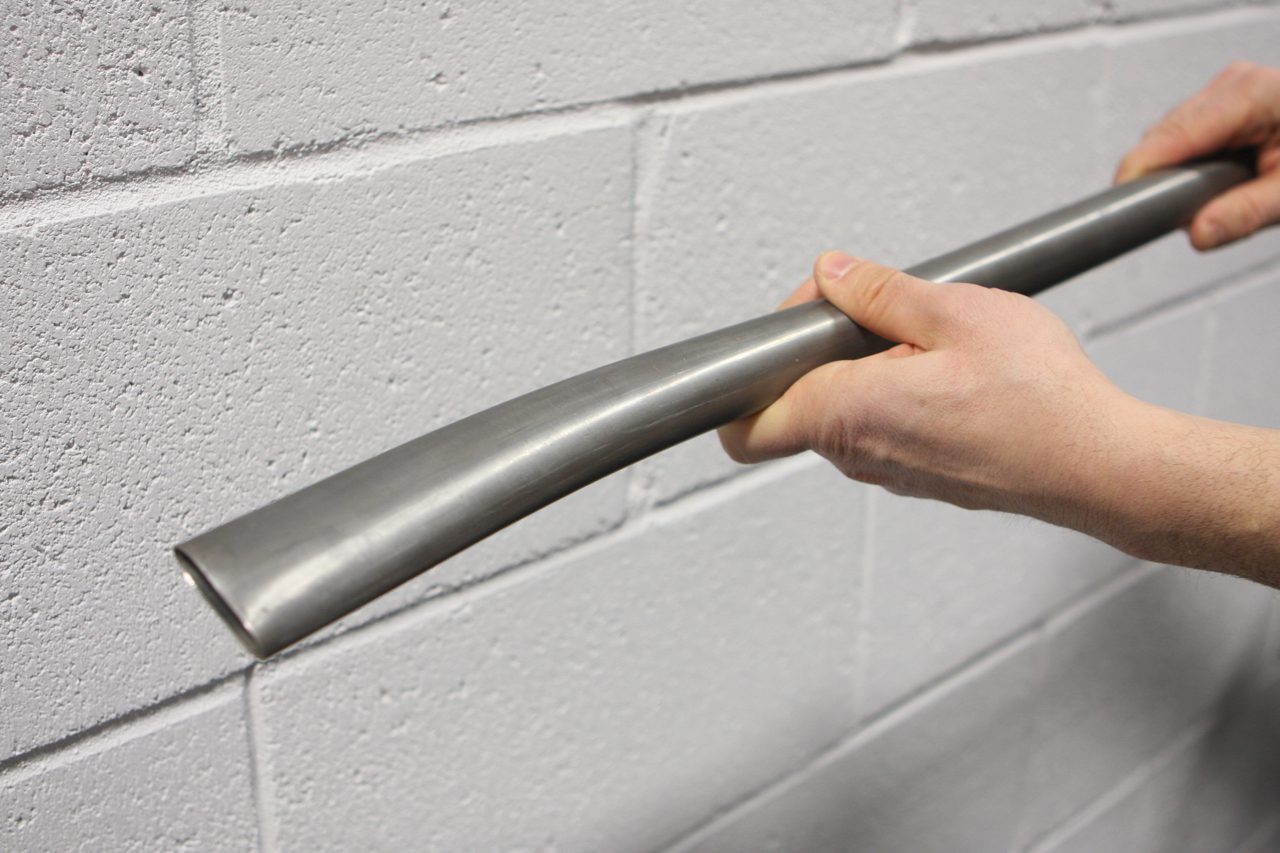
Proprietary tube shaping
T-Lab’s real secret is manipulating the chosen titanium tubing into shapes that improve the bike’s ride performance. To achieve the radical tubing shapes seen on T-Lab frames, the builders employ a proprietary cold-worked shaping process that is all done at the factory in Montreal. While the company is unwilling to reveal the details of how it’s done, the whole process improves the stiffness of the titanium where it’s needed. Builders don’t heat the metal, which could compromise its properties. Also, they are not hydroforming, which would be cost prohibitive.
Each frame is built slightly differently depending on the buyer’s specifications. For its high-end X3 and R3 models, the process involves creating a profiled top tube for lateral rigidity, a curved seat tube for immediate power transfer and a shaped down tube for precise steering and frame stiffness.
“We cold work the metal to shape the material and make it behave like carbon in key areas in order to overcome the limitations of titanium,” says Rossi. “This allows us to make titanium bikes that are as stiff as carbon in key areas but keep the ride qualities of titanium.”
The result are frames that are 30 per cent stiffer than Ti bikes built with traditionally shaped tubes.

Welding
Next, the frame is welded together. This is an area T-Lab’s employees have years of experience with. The welders came over from Guru, where they were building hundreds of steel, aluminum and titanium bikes a year. Keeping the whole process in Montreal was important for T-Lab. Its founders have a long history with the process. Tony Giannascoli started Guru by TIG welding steel frames before leading the company to build frames with composites. With a singular focus on welding titanium, T-Lab has perfected its process to ensure that the most important part of the building process is completed meticulously to ensure long-lasting structural integrity, durability and performance.
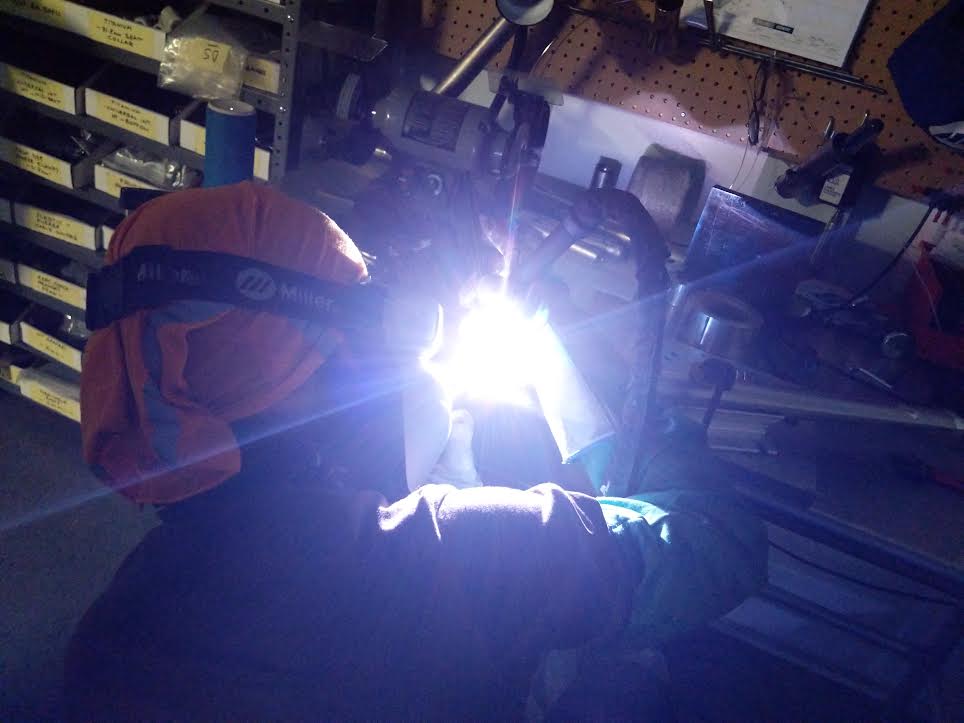
Finishing the titanium frames
T-Lab bikes are completed with carbon forks and the company’s T-One dropouts. Finishing the frame also takes place in-house. “We’ll finish our bikes here in Montreal. We do all the polishing, brushing, bead blasting and painting. We use high-end automotive paint, so the F1 Red, for example is the same paint used by the most famous of sports cars,” says Rossi.
The modern esthetic of the bikes is something T-Lab is very proud of. While the tubing shapes are firstly functional, they also create a much more modern looking bike that has dynamic curves rarely seen on frames made from metals.
Build in Montreal by Montrealers
T-Lab doesn’t handbuild its bikes in Montreal because it’s more cost-effective. Instead, it allows the company to have a shorter cycle from development to production and ensures it’s meeting its quality standards. Montreal also offers some interesting development opportunities that T-Lab takes advantage of and the city has a vibrant cycling culture.
“Montreal is an aerospace bastion. We have access to a lot of intelligence and suppliers with the confluence of modern aerospace engineering and the European legacy of cycling in a place that is buried in snow six months of the year,” Rossi says with a laugh. “There is something about cycling here that you don’t find anywhere else in North America. It informs the way we do things, even the potholes.”

The titanium bike of the future
T-Lab is pushing the boundaries of titanium bicycles. The company is building road, gravel and cyclocross frames designed to climb, descend, go fast, be versatile and reflect the way modern riders are using their bicycles. Their bikes can accommodate anything the modern rider wants to do with a bike. With a cutting-edge building process, T-Lab’s custom, handbuilt bikes are designed to offer the characteristics of modern performance bikes while providing the everlasting ride quality of titanium.
